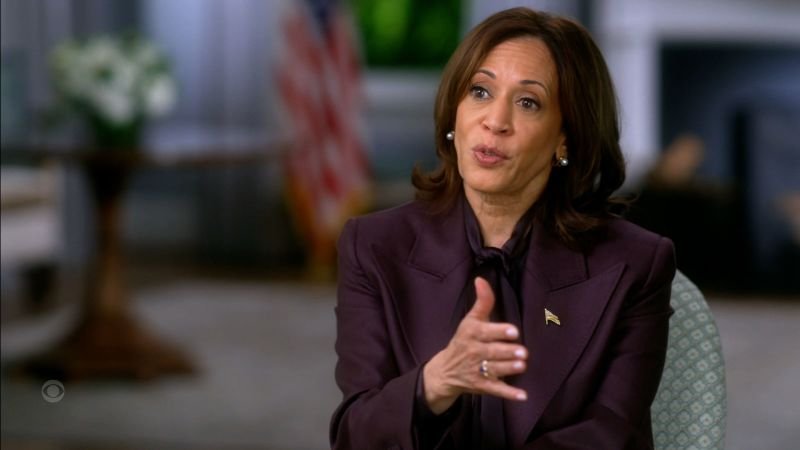
CNN
—
The Trump administration’s request for the raw material of a “60 Minutes” segment is raising red flags across the media industry.
The segment in question is last October’s interview with then-Vice President Kamala Harris. President Trump sued CBS in a federal court alleging that the interview was deceptively “doctored” to help Harris beat Trump. CBS insisted that it was not doctored.
A pro-Trump group also lodged a formal “news distortion” complaint about the “60 Minutes” segment with the Federal Communications Commission, the government agency that licenses local TV stations. That’s what prompted new FCC Chairman Brendan Carr to send a “letter of inquiry” to CBS, asking the network to hand over the unedited tapes and transcript.
Lawyers and researchers who follow the FCC closely raised First Amendment concerns over the inquiry, pointing out that the agency’s inquiries to stations usually involve technical matters, not news coverage.
But Carr told CNN in an interview that the letter was necessary.
“I don’t see how the FCC can reasonably adjudicate this claim of news distortion without seeing what was actually said,” in the interview, Carr said.
His predecessor atop the FCC, Jessica Rosenworcel, who was appointed by Barack Obama and promoted to chair by Joe Biden, had dismissed the complaint in one of her last acts as FCC chair, warning that the complaints “seek to curtail freedom of the press.”
But Carr, who Trump appointed in 2017 and promoted to chair last month, almost immediately revived the complaint.
“There is no historical antecedent for this kind of highly partisan intervention by an FCC chairman,” public interest lawyer Andrew Jay Schwartzman, who has nearly 50 years of experience in this space, told CNN.
Schwartzman said the media-regulating agency has broad powers to investigate rule violations – for example, indecency on broadcast airwaves – but said “this incident reeks of the abuse of that power for partisan political objectives.”
Anna M. Gomez, one of two Democrats on the Republican-controlled commission, said much the same thing when the letter was sent to CBS last week. “This is a retaliatory move by the government against broadcasters whose content or coverage is perceived to be unfavorable,” Gomez said. “It is designed to instill fear in broadcast stations and influence a network’s editorial decisions.”
“CBS rolled over”
Instead of saying “no” on First Amendment grounds – or at least putting up a fight before handing over the tapes – CBS said it was “legally compelled” to comply. Some experts dispute that, however.
“They have no obligation to turn those materials over,” said Christopher Terry, associate professor of media law at the University of Minnesota, who has been studying the FCC for years.
“There’s no question CBS rolled over,” Terry added. “The question is why, and the answer seems obvious: They’re going for a big merger later this year and they’re doing everything they can to play nice.”
A CBS spokesperson declined to comment. CBS parent Paramount Global is waiting for the Trump administration to sign off on its pending deal with Skydance.
Paramount is simultaneously trying to settle Trump’s lawsuit, according to a person involved in the matter, despite the fact that many outsiders say the company has a very strong legal case.
Reports about a possible settlement have been demoralizing to CBS News employees since there is no evidence of wrongdoing.
“60 Minutes” aired two different answers from Harris to a single question about why Israeli Prime Minister Benjamin Netanyahu was “not listening” to the United States. As criticism mounted and Trump threatened to sue, CBS said there was nothing nefarious about the editing; one part of her answer was shown in a preview clip, and the other part of her answer was shown during the actual “60 Minutes” broadcast.
CBS said it “did not hide any part of the Vice President’s answer to the question at issue.”
But Carr says he needs to see the unedited tapes in order to confirm that account.
In an interview with CNN, Carr also pointed out that CBS refused to release the full Harris transcript last fall, but has published full transcripts of interviews with other newsmakers, including one with Vice President J.D. Vance just yesterday.
He called the “60 Minutes” issue “a rare situation” — one that was triggered by CBS airing two different parts of an answer to the same question.
Still, Michael Copps, a Democratic former FCC commissioner, said political and corporate interests are very much at play.
“This seems less about legal niceties than a clash of interests between the Administration’s larger attempt to strike fear into the media on the one hand and a pending big media company’s business merger that requires official approval on the other, which some think a settlement would encourage,” Copps said.
“If the new Administration and the new FCC can strike paralyzing fear into our nation’s media, it will be a sad day for what’s left of our democracy,” he added.
Democratic Senator Ed Markey spoke out against Carr’s request for the tapes and transcript, asserting that Carr is “rapidly turning the FCC into the Federal Censorship Commission. It’s wrong and dangerous.”
Jay Newman, who worked in senior positions at CBS Television Stations for more than three decades, said the company had “aggressively protected outtakes and raw video” in the past.
“The strong feeling was these were considered ‘work product’ – akin to a reporter’s notes,” he said. “The precedent set by releasing these to a government agency is abhorrent. The FCC should stick to its core mission and not being in the business of regulating content through intimidation.”


